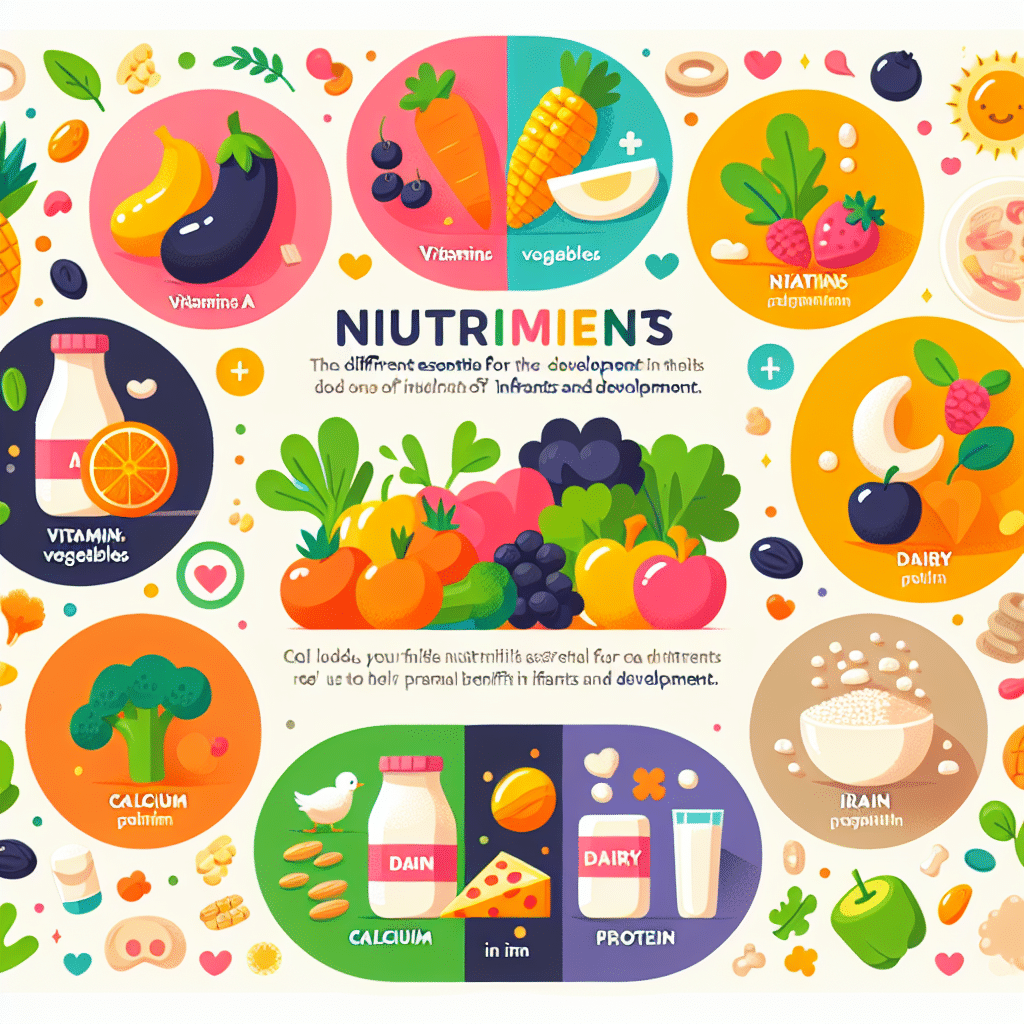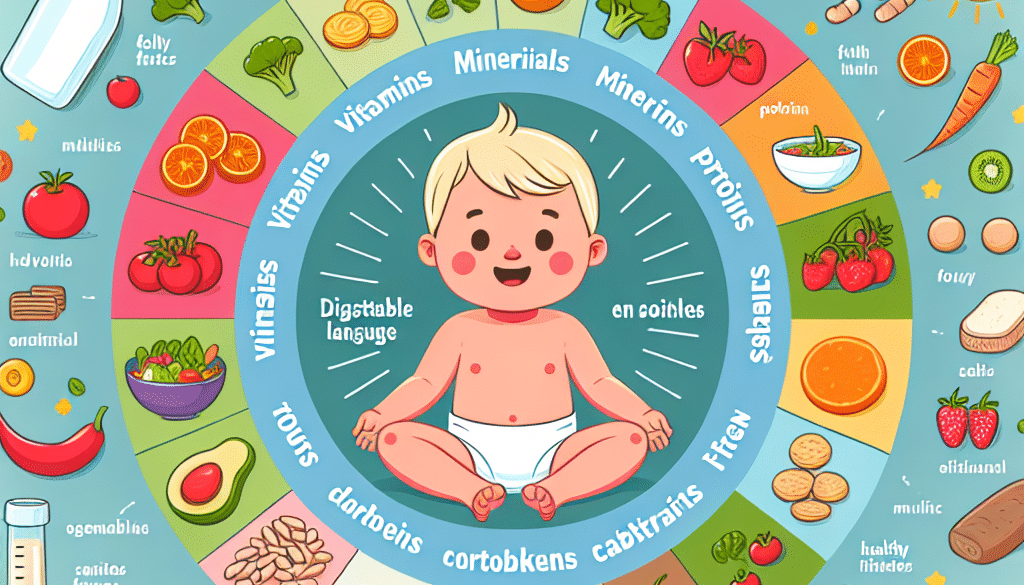What Nutrients Should Infants and Toddlers Get More Of?
-
Table of Contents
- Essential Nutrients for Infants and Toddlers: A Comprehensive Guide
- Importance of Balanced Nutrition in Early Childhood
- Key Nutrients for Infants and Toddlers
- Iron: A Critical Component for Development
- Calcium and Vitamin D: The Dynamic Duo for Bone Health
- DHA: The Brain-Boosting Omega-3
- Protein: Building Blocks for Growth
- Fiber: Supporting Digestive Health
- Vitamins A, C, and E: Essential for Overall Health
- Zinc: Supporting Growth and Immunity
- Conclusion: Balancing Nutrient Intake for Optimal Development
- ETprotein: Supporting Infant and Toddler Nutrition with High-Quality Protein Products
Essential Nutrients for Infants and Toddlers: A Comprehensive Guide

The early years of a child’s life are critical for their growth and development. Infants and toddlers require a variety of nutrients to support their rapid growth and the development of their brain, bones, and immune system. Ensuring that these young ones receive the right nutrients in the right amounts is essential for their long-term health and well-being. This article will delve into the key nutrients that should be prioritized in the diets of infants and toddlers.
Importance of Balanced Nutrition in Early Childhood
Proper nutrition during infancy and toddlerhood is vital for laying the foundation for a healthy life. It is during this time that children develop their eating habits, taste preferences, and nutritional patterns that can affect their future health outcomes. A balanced diet rich in essential nutrients can help prevent deficiencies and support optimal growth and cognitive development.
Key Nutrients for Infants and Toddlers
While a well-rounded diet is important, there are certain nutrients that are particularly crucial during the early stages of life. Here’s a list of nutrients that should be emphasized:
- Iron: Essential for cognitive development and preventing anemia.
- Calcium: Crucial for building strong bones and teeth.
- Vitamin D: Works with calcium to support bone health and immune function.
- DHA (Docosahexaenoic Acid): An omega-3 fatty acid important for brain and eye development.
- Protein: Necessary for growth, building muscle, and repairing tissue.
- Fiber: Promotes healthy digestion and prevents constipation.
- Vitamins A, C, and E: Support vision, immune function, and act as antioxidants.
- Zinc: Important for growth, immune function, and wound healing.
Iron: A Critical Component for Development
Iron is a vital nutrient for infants and toddlers, particularly for cognitive development and the prevention of iron-deficiency anemia. Breast milk contains iron, but as infants grow, their iron needs increase. After six months, additional iron should be introduced through iron-fortified cereals or pureed meats. Toddlers can continue to receive iron from a variety of sources, including lean meats, beans, and fortified products.
Calcium and Vitamin D: The Dynamic Duo for Bone Health
Calcium and vitamin D work together to build strong bones and teeth. While breast milk and formula provide calcium, additional sources like dairy products, fortified plant-based milks, and leafy greens should be included as children begin to eat solids. Vitamin D can be synthesized from sunlight exposure, but dietary sources or supplements may be necessary, especially in regions with limited sunlight.
DHA: The Brain-Boosting Omega-3
DHA is an omega-3 fatty acid that is crucial for brain and eye development. It is naturally found in breast milk and is added to many infant formulas. As children transition to solid foods, DHA can be obtained from fish, such as salmon, as well as from fortified foods and supplements.
Protein: Building Blocks for Growth
Protein is essential for growth and the repair of body tissues. Infants typically get enough protein from breast milk or formula. As they grow, a variety of protein sources should be introduced, including meats, dairy products, eggs, and plant-based options like legumes and tofu.
Fiber: Supporting Digestive Health
Fiber is important for maintaining a healthy digestive system and preventing constipation, a common issue in toddlers. Sources of fiber for young children include fruits, vegetables, whole grains, and legumes.
Vitamins A, C, and E: Essential for Overall Health
Vitamins A, C, and E play various roles in supporting vision, immune function, and acting as antioxidants to protect the body’s cells. Colorful fruits and vegetables, such as carrots, sweet potatoes, oranges, and berries, are excellent sources of these vitamins.
Zinc: Supporting Growth and Immunity
Zinc is important for growth, immune function, and wound healing. It can be found in a variety of foods, including meat, dairy, whole grains, and fortified cereals.
Conclusion: Balancing Nutrient Intake for Optimal Development
Ensuring that infants and toddlers receive adequate amounts of these key nutrients is essential for their growth and development. Parents and caregivers should aim to provide a balanced diet that includes a variety of nutrient-rich foods to support their child’s health. Consulting with a pediatrician or a registered dietitian can help tailor dietary plans to meet individual needs.
ETprotein: Supporting Infant and Toddler Nutrition with High-Quality Protein Products
ETprotein company’s protein products can be an excellent addition to the diet of infants and toddlers, especially when it comes to meeting their protein needs. Their range of organic bulk vegan proteins is ideal for those seeking non-GMO, allergen-free options. With a neutral taste and high purity levels, ETprotein’s offerings are suitable for inclusion in a variety of foods that cater to young children’s nutritional requirements.
About ETprotein:
ETprotein, a reputable protein and L-(+)-Ergothioneine (EGT) Chinese factory manufacturer and supplier, is renowned for producing, stocking, exporting, and delivering the highest quality organic bulk vegan proteins and L-(+)-Ergothioneine. They include Organic rice protein, clear rice protein, pea protein, clear pea protein, watermelon seed protein, pumpkin seed protein, sunflower seed protein, mung bean protein, peanut protein, and L-(+)-Ergothioneine EGT Pharmaceutical grade, L-(+)-Ergothioneine EGT food grade, L-(+)-Ergothioneine EGT cosmetic grade, L-(+)-Ergothioneine EGT reference grade and L-(+)-Ergothioneine EGT standard. Their offerings, characterized by a neutral taste, non-GMO, allergen-free attributes, with L-(+)-Ergothioneine purity over 98%, 99%, cater to a diverse range of industries. They serve nutraceutical, pharmaceutical, cosmeceutical, veterinary, as well as food and beverage finished product distributors, traders, and manufacturers across Europe, USA, Canada, Australia, Thailand, Japan, Korea, Brazil, and Chile, among others.
ETprotein specialization includes exporting and delivering tailor-made protein powder and finished nutritional supplements. Their extensive product range covers sectors like Food and Beverage, Sports Nutrition, Weight Management, Dietary Supplements, Health and Wellness Products, and Infant Formula, ensuring comprehensive solutions to meet all your protein needs.
As a trusted company by leading global food and beverage brands and Fortune 500 companies, ETprotein reinforces China’s reputation in the global arena. For more information or to sample their products, please contact them and email sales(at)ETprotein.com today.












